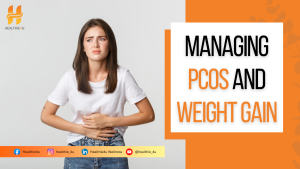

18% of women of reproductive age, ranking it among the most common hormonal conditions. It
affects about one in 10 women. This complex syndrome manifests through a range of symptoms
linked to hormonal imbalances, especially insulin resistance and heightened androgen levels (often
referred to as male hormones).
Typical Symptoms Associated With PCOS:
● Irregular menstrual cycle-
Women with PCOS frequently encounter irregular, infrequent, or
extended menstrual cycles. This may manifest as periods occurring more than 35 days apart
or fewer than eight cycles in a year.
● Ovarian cyst-
Multiple small cysts can develop in the ovaries when follicles fail to mature and
release eggs. This disruption is often linked to higher levels of androgens, which impairs the
typical functions of ovaries.
● Weight gain-
Increased insulin levels can contribute to weight gain by enhancing hunger,
facilitating fat storage, and hindering the body’s ability to break down stored fat.
● Hirsutism-
Higher levels of androgens can cause increased hair growth in areas like the face,
chest, and back, typically associated with male-pattern hair growth.
● Acne-
Increased androgen levels can make the skin oilier than normal, often resulting in acne
flare-ups, especially on the face, chest, and upper back.
● Alopecia-
Androgenic alopecia, commonly known as male-pattern baldness, can affect
women with PCOS and is directly linked to the elevated androgen levels.
● Acanthosis Nigricans-
Darkened patches of skin, especially in areas like the neck, groin, and
under the breasts is known as acanthosis nigricans, can indicate insulin resistance and are often
observed in women with PCOS.
● Few other symptoms include depression, anxiety, sleep disturbances, food cravings, infertility,
etc.
Managing PCOS typically focuses on correcting hormonal imbalances through lifestyle changes,
including a balanced diet and regular exercise. Additionally, medications and oral supplements for
women may be used to regulate menstrual cycles, tackle insulin resistance, and lower androgen levels.
Link between PCOS and Weight Gain:
The connection between obesity and PCOS is quite multifaceted. Women with PCOS frequently
experience insulin resistance, which can contribute to weight gain. This additional weight can further
intensify PCOS symptoms, perpetuating a challenging cycle.
Carrying excess weight often leads to increased inflammation and hormonal imbalances, which can
worsen issues such as irregular menstrual cycles and excessive hair growth. On the other hand, the
metabolic difficulties that come with PCOS can make weight management more challenging, resulting
in a higher incidence of obesity among affected women.
To address both weight and PCOS symptoms, adopting lifestyle changes like a balanced diet and
regular exercise can be beneficial. In some cases, medical interventions may be needed to effectively
manage symptoms and improve overall well-being.
Here are some effective weight management strategies for women with PCOS:
● Eat a balanced diet-
A well-balanced meal plan that focuses on non-starchy vegetables, fruits,
lean proteins, healthy carbohydrates, and low-fat dairy can be beneficial for individuals with
PCOS.
● Choose low GI foods-
Eating low GI foods may help in PCOS as it prevents the spike in
blood glucose levels and reduces insulin resistance. Meat, poultry, eggs, nuts, beans, and
some fruits and vegetables typically have low GI values.
● Have small frequent meals-
To maintain a consistent blood glucose levels, small frequent
meals, that is about every 4 hours is recommended.
● Include Omega- 3 rich foods-
Omega-3 fatty acids are known to reduce inflammation and act
as powerful antioxidants. They help manage blood pressure and blood glucose levels, which
can support weight loss in individuals who are overweight. Furthermore, these fatty acids help
regulate hormone levels, which may improve fertility. Fatty fish, walnuts, chia seeds, hemp
seeds, and flaxseeds are among the richest sources of omega-3 fatty acids.
● Physical activity-
Engaging in regular physical activity is crucial for managing PCOS. It can
alleviate symptoms and lower the risk of long-term health issues like type 2 diabetes and
cardiovascular disease. It has multiple benefits such as:
○ Enhanced energy levels and overall fitness
○ Effective weight loss and maintenance
○ Boosted self-confidence and motivation
○ Better emotional well-being
○ Decreased androgen production and insulin resistance
○ More regular menstrual cycles
○ Improved fertility outcomes
A combination of cardio exercise and muscle strength activity is recommended.
● Supplements–
Numerous vitamins and herbal supplements have been researched for their
potential benefits in managing PCOS which include Chromium, Curcumin, Vitamin D,
Inositol, Berberine, CoQ10, etc.
In summary, effectively managing PCOS and related weight gain relies on a personalized,
well-balanced diet. Focusing on whole foods such as non-starchy vegetables, lean proteins, and
healthy fats can help regulate insulin levels, reduce inflammation, and promote hormonal balance. In
addition to a nutritious diet, incorporating regular physical activity can further enhance management
strategies. By focusing on these dietary choices, individuals with PCOS can enhance their overall
health, alleviate symptoms, and cultivate a greater sense of well-being.
